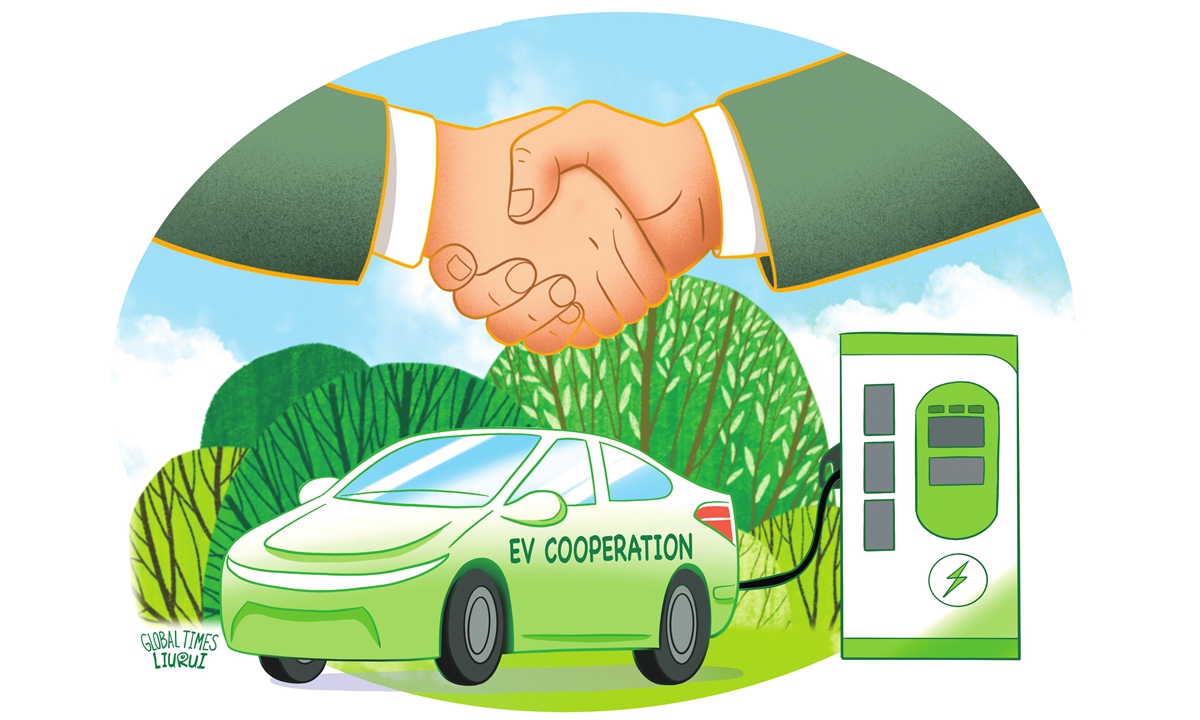
Illustration: Liu Rui/GT
China's electric vehicles (EVs) have been one of the favorite targets of the US media's "bad China" narrative, and now their attention has zeroed in on Chinese EV makers entering the Thai market. On Monday, a Los Angeles Times article claimed, "On a quest for global domination, Chinese EV makers are upending Thailand's auto industry." What an absurd, far-fetched accusation.
Known as the "Detroit of Asia," Thailand has for a long time been recognized as the primary manufacturer of automobiles among ASEAN countries and has gained traction in the automobile export industry. Thailand's Board of Investment initiated the eco-car scheme in 2007 - the first in Southeast Asia. The scheme provides a multitude of opportunities for foreign investors in Thailand's automobile manufacturing industry. It is clear that the decision by Chinese EV manufacturers to invest in Thailand meets the country's needs both in terms of policy and market considerations.
However, the Los Angeles Times article argues that the changes currently facing Thailand's automotive industry are all China's fault. The article claimed that Japanese car factories in Thailand are shutting down or scaling back. According to it, as the world embraces zero-emission vehicles and gas-powered cars fall out of favor, the anxiety of losing their jobs has spread among Thai auto workers. And "the primary culprit" is none other than Chinese EVs, said the US' media outlet.
Xu Liping, director of the Center for Southeast Asian Studies at the Chinese Academy of Social Sciences, told the Global Times that this absurd logic clearly demonstrates that this US media outlet wears "colored glasses" to see Chinese EVs. He believes the changes occurring in Thailand's automotive market are due to the country's alignment with the global push for clean energy development. The competition between EVs and gasoline cars is driven by market forces, not by external intervention. In this context, Chinese EVs are a crucial part of combating climate change. The decline in demand for gasoline cars is part of a global trend. The idea that Chinese EVs are "upending" Thailand's automotive industry is completely nonsensical, Xu said.
This US media may appear to be speaking up for Thailand's automotive industry, but in reality, they are defending traditional gasoline vehicles, represented by Japan. However, the real struggle of Japan's traditional energy cars isn't due to "competitors" in the Thai market but to their slow move to keep up with the times, leading to a global decline. According to Nikkei Asia, global production of eight Japanese passenger vehicles dropped by 6 percent on the year.
The US media has been quick to label Chinese EV makers while turning a blind eye to the high-quality cooperation between China and Thailand. In reality, Chinese EV companies' investments in Thailand align closely with the Thai government's long-term vision, representing a mutually beneficial partnership. According to CNA, Thailand wants to ensure that 30 percent of all vehicles made in the country will be zero-emission vehicles by 2030. Therefore, China's EV industry in Thailand perfectly matches Bangkok's focus on investing in green industries, promoting clean energy, and pushing for the full-scale development of the EV sector.
Chinese EV makers are bringing vitality to Thailand not only through industrial transformation and upgrades but also by creating local job opportunities and offering more consumer choices. In July this year, BYD's factory in Thailand opened, with an annual capacity of 150,000 EVs, and once fully operational, it is expected to generate 10,000 jobs in Thailand. Beyond EV cooperation with Thailand, China is also intensifying its investment in renewable energy industries across Southeast Asia, including advanced photovoltaics and new-energy storage markets, driving rapid development of the region's green economy.
The growth of China's new-energy industry in Southeast Asia is not only a vivid manifestation of China's modernization benefiting the Global South, but also presents development opportunities for Southeast Asian countries. China's rapid progress in this sector is nothing but an opportunity for global green transformation, rather than being maliciously portrayed as a "risk." As this cooperation deepens, more Southeast Asian countries will benefit from the wave of green transformation.




